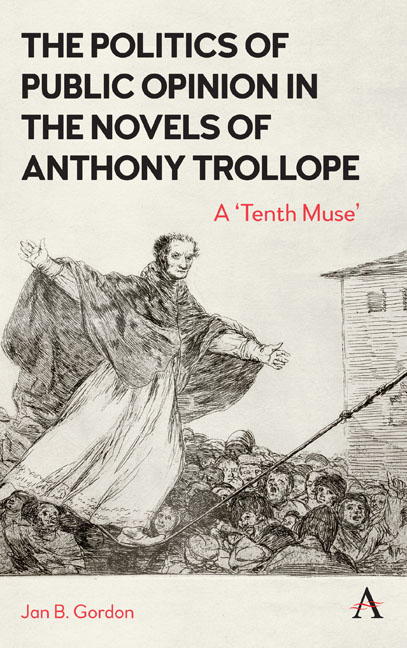Book contents
- Frontmatter
- Frontispiece
- Contents
- Preface: Overture to an Initial Public Offering
- Chapter One The “Prosthetic Body” of Public Opinion in Barsetshire
- Chapter Two Miming the Law
- Chapter Three “Playing” the Opinion Market
- Chapter Four The “Management” of Public Opinion in Trollope’s Bureaucracies
- Chapter Five The Sugar
- Index
Preface: Overture to an Initial Public Offering
Published online by Cambridge University Press: 17 October 2023
- Frontmatter
- Frontispiece
- Contents
- Preface: Overture to an Initial Public Offering
- Chapter One The “Prosthetic Body” of Public Opinion in Barsetshire
- Chapter Two Miming the Law
- Chapter Three “Playing” the Opinion Market
- Chapter Four The “Management” of Public Opinion in Trollope’s Bureaucracies
- Chapter Five The Sugar
- Index
Summary
This volume conceptually began as a response to an exposure to public opinion formation: literary criticism. A reviewer of my Gossip and Subversion in Nineteenth-Century British Fiction: Echo's Economies found, to my pleasant surprise, much to praise. But in the same essay, the reviewer who, like much public opinion, should perhaps remain anonymous, also queried a conspicuous absence: the lack of interest in victims, those gossiped about. Her criticism, as the best criticism always does, initiated self-criticism. For, it was not the first time that my lack of sympathy for the victimized had been queried.
Compassion for the unfamiliar is always difficult, but perhaps particularly so for the critic who risks imaginary detachment (a fictional autonomy masking as objectivity) from feelings that risk sentimentality. Given the expanding population of those who see themselves as victims of some prejudice, sympathy is tempered by the universality of the experience. Ours is an age marked by the proliferation of the presumably sincere account of harm at the hands of unacknowledged institutional or personal aggression.
Although each of us is immersed in it and lives in our negotiated responses and defenses to public opinion, it can be manipulated for temporary or permanent advantage. It seems a medium of existence as well as exchange that we cannot avoid insofar as we have a place in a discursive society, enhanced now by speedier platforms and easier access. In the novels of Anthony Trollope public opinion becomes a master narrative, often displacing other narratives.
In discussing public opinion and how it is formed, negotiated and represented to those who live in it (and are re-represented in their responses to it), we should admit at the outset that it resists easy address as a traditional subject. For public opinion lacks a proper “self,” more nearly resembling a “form,” “structure” and movement of potentially infinite referral (renvoi), as Jean-Luc Nancy once described the non-indexical and nonsignficational modes of listening characteristic of musical performances. When we address public opinion formation in the Barsetshire Novels and the Palliser Novels (often referred to as the Parliamentary Novels) of “our” Anthony Trollope, the Victorian novelist who continually probes how his characters both shape it and respond to its shaping of them, we are really addressing a new kind of philosophical subject in the novel.
- Type
- Chapter
- Information
- The Politics of Public Opinion in the Novels of Anthony TrollopeA 'Tenth Muse', pp. viii - xviPublisher: Anthem PressPrint publication year: 2023



